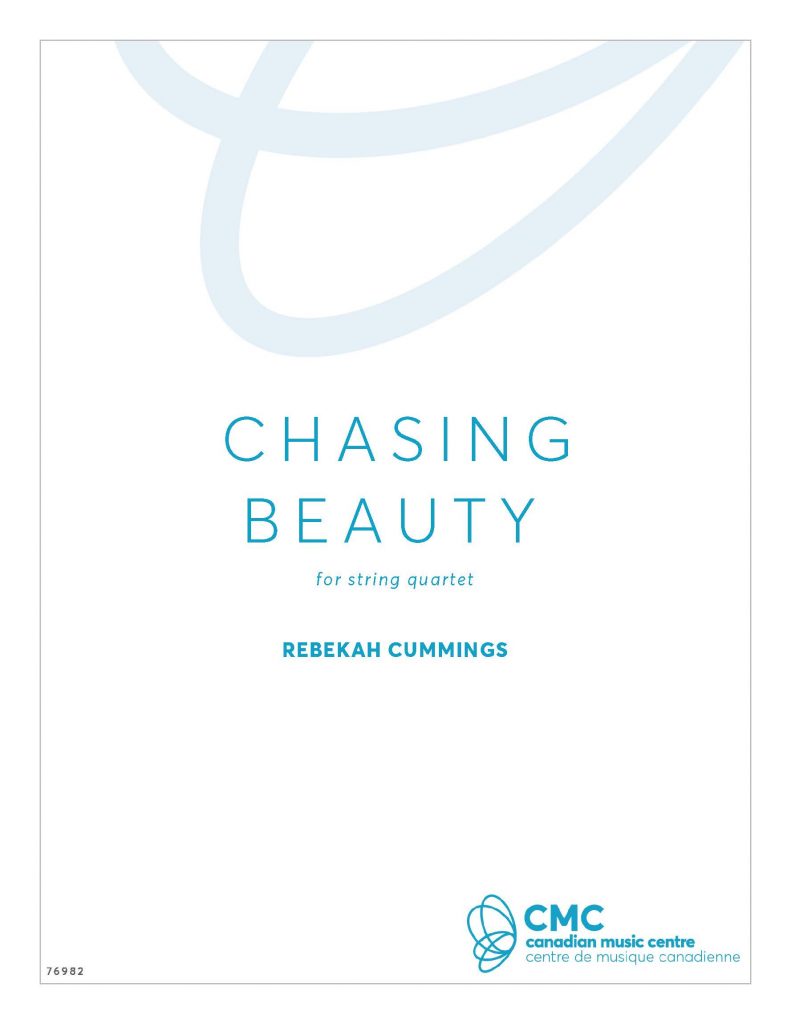Chasing Beauty is my first attempt at writing for string quartet, and it’s turned out to be quite a vulnerably honest musical window into my soul! Though I hate to admit it, I’ve been chasing beauty for most of my life, spurred on by the impossible standards of the media and the unrealistic aesthetic norms of our modern society. Often against my will (and predominantly internally rather than externally), I’ve chased after this ever-elusive “carrot” dangling in front of me — desperately trying to attain the world’s version of beauty and avoid the supposed shame of falling short. As I’ve painfully faced the fact that I simply cannot jump through all these hoops or make the grade, I’ve felt compelled to face the thing that’s driving me and fight it head-on. This is no easy task, since the battleground is in my mind! So, I’ve been asking myself challenging questions, like: What is beauty, anyway? How is it defined? Whose standards am I measuring myself by, and why? Is it safe to jump off this crazy bandwagon? Am I brave enough? What is the truth that will finally liberate me from this madness?
Musically, the piece moves through several distinct emotional stages, with harmonic and rhythmic fragmentation representing the turmoil of my thinking concerning myself and beauty. It begins playfully, in Balkan-style (my comfort-zone — the music of my heritage). The chase sounds a bit like a dance, or a child merrily trying unsuccessfully to catch a butterfly. At this stage, beauty is just a tease. The musical fragmentation feels light and humorous, though mocking at times.
During the next phase, the music becomes increasingly fragmented. It culminates in an atonal mess of agonizing honesty: beauty is impossible — it’s against me. This is devastating to finally come to terms with. This section consists of music I never would have chosen to write. It was quite a challenging, messy process, and quite healing for me to have to be so “musically honest”. Following this section is the sound of resignation. Here, I surrender. The music is steady and solemn, with very little metric or harmonic change, based on the drone of a slow col legno ostinato. It’s almost like a funeral dirge, but in a positive sense — letting the old ways die.
Then things get a little strange… the fragmentation starts again, but in a distinctly different voice, as if the clouds keep parting to reveal the sun, or like a radio spontaneously switching over to a station I wouldn’t normally listen to. To achieve this sound, I composed a small, traditional-sounding piece and inserted fragments of it at random spots in the music, and marked those sections sul tasto — to be heard as coming from a far-away time and place. Ultimately, this new voice is woven together with the old, then overrides it and abandons the sul tasto, coming to the forefront.
As the piece climaxes, the main theme comes back (which the cello began with at the outset almost like a tease, and which was woven through the Balkan dance-like part as well as the “breakdown” section). Why has it returned? Doesn’t it represent the very mindset that needs to be discarded and replaced? Aren’t I leaving that behind? Nope. This is my story to tell — this is my journey.
The main theme stays, but it transforms. It’s bold and confident, with a tinge of mourning to it. Scars are worn as medals now, proudly and vulnerably.
To conclude, the piece ends with an unexpectedly sparse, Celtic-like passage, based on a drone which includes the sound of the players’ voices (I wanted it to sound especially personal).
The melody is based on a song I wrote many years ago, called “Beautiful”.
The lyrics which the melody represents are as follows:
“In the pit of my despair, I found a treasure, beautiful
I left my fear and striving there, embraced this journey as a jewel
Seasons seem to pass me by, but I’ll await His perfect time
When I, a worm, turned butterfly
May find myself made beautiful.”

